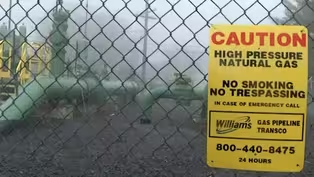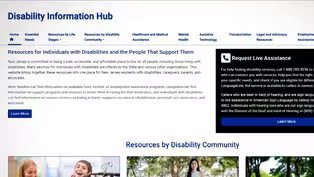NJ Spotlight News
Soaring temperatures heighten health risks
Clip: 7/31/2024 | 4m 48sVideo has Closed Captions
Interview: Lilo Stainton, reporter, NJ Spotlight News
Nearly 200 people in New Jersey died of heat stroke between 2000 and 2020, according to state data. NJ Spotlight News' health care writer Lilo Stainton reports those figures are only the tip of the iceberg when it comes to the impact of heat.
Problems playing video? | Closed Captioning Feedback
Problems playing video? | Closed Captioning Feedback
NJ Spotlight News is a local public television program presented by THIRTEEN PBS
NJ Spotlight News
Soaring temperatures heighten health risks
Clip: 7/31/2024 | 4m 48sVideo has Closed Captions
Nearly 200 people in New Jersey died of heat stroke between 2000 and 2020, according to state data. NJ Spotlight News' health care writer Lilo Stainton reports those figures are only the tip of the iceberg when it comes to the impact of heat.
Problems playing video? | Closed Captioning Feedback
How to Watch NJ Spotlight News
NJ Spotlight News is available to stream on pbs.org and the free PBS App, available on iPhone, Apple TV, Android TV, Android smartphones, Amazon Fire TV, Amazon Fire Tablet, Roku, Samsung Smart TV, and Vizio.
Providing Support for PBS.org
Learn Moreabout PBS online sponsorshipIt's been a scorcher this summer.
And the heat isn't just uncomfortable.
It could also be considered a silent killer.
Nearly 200 people in New Jersey died of heatstroke between 2020 20, state data shows.
But as health care writer Lilo Stainton reports, those figures are only the tip of the iceberg when it comes to the impact of heat.
She sat down with me to discuss more.
Lilo, Thanks for joining me.
Thank you Raven.
So it has been a severely hot summer record temps, and according to your reporting, that he can also be considered a silent killer.
So explain that.
How so?
Yeah, it's interesting.
Considered a silent killer, largely because we don't talk about it enough on the media and we don't.
And it's not as visual.
I listen to this great podcast.
Thank you, John Reitmeyer.
That like it was all about how, you know, in the media, when you have a flood or another disaster, there's so many visuals and it's a really clear story with heat.
It's sort of subtle.
It kills people who are older, it kills people who are poorer.
They end up in the hospital.
So what's behind closed doors?
That's why it's sort of silent.
And, you know, we're left with images of, you know, fried eggs on the sidewalk and fire hydrants, you know.
So part of that is us not being good at telling the story.
So you mentioned who it kind of impacts the most.
So what are the warning signs that folks should look out for?
I mean, absolutely.
They're they're really common.
And I do think it's important to say this is one of these conditions, heat, you know, health related things where money really separates us.
Right.
People with just a moderate amount of income can usually have air conditioning, and that's a key.
So, you know, symptoms of heat exhaustion, which is sort of the first stage, are, you know, profuse sweating, you know, achyness having a headache if it progresses where you get --, but you're extremely hot or you get really confused.
That's more those are more signs of heat stroke and that involves going to you really should go to an emergency room, according to the people that I talked to.
Heat exhaustion, the treatment is come inside, cool off, drink water, and and give your body time to recover, because it really does take time.
So the good thing is here in New Jersey, they are trying to prevent that.
Right.
Prevent heat related injuries and deaths with some regulation.
Walk me through some of those.
Yeah, I mean, they are I think, first of all, there's just sort of more awareness about it in clinical conditions.
You know, doctors are seeing more of it.
You know, the doctor I spoke with, Dr. Henry Dunn, said you know, she sees it in all kinds of age groups.
Right.
Because it's the elderly are most vulnerable people with underlying conditions and, of course, asthma, diabetes, you know, heart condition.
Who doesn't have one of those?
Right.
And a few others.
And I think, you know, and younger kids, she said kids are really susceptible because because you don't necessarily they can just go and go and go and suddenly they crash and you don't see it coming.
So I think, yes, there are efforts both by medical groups, there's some legislative efforts that are new, but there's, you know, generally, hopefully a growing awareness and just pleas, like the doctor I said talked to, you know, consider it like it's it's dangerous weather because it is, you know.
And just just quickly, before we leave, what are what are three main takeaways for someone who has to plan for extreme heat?
What are three recommendations you would give them?
Right.
Hydration, you know, of course, seek shade and cooling when you can.
And just as much as possible.
Limit that time outdoors.
She made a great example.
You know if you're going to an amusement park, do go go in the morning, in the afternoon evening.
Don't go go home for lunch, spend a few hours by the pool, you know, take a break.
Right.
All right, Lilo keeping us cool and say thank you.
Thank you, Raven.
And take care.
Support for the medical report is provided by Horizon Blue Cross Blue Shield of New Jersey.
An independent licensee of the Blue Cross Blue Shield Association.
Black women back Harris: It's 'Obama on steroids'
Video has Closed Captions
Clip: 7/31/2024 | 5m 17s | Democratic Party is cautioned not to take support for granted (5m 17s)
Federal court blocks controversial pipeline expansion
Video has Closed Captions
Clip: 7/31/2024 | 1m 13s | Enviro coalition argued FERC ignored potential harms of Regional Energy Access Expansion (1m 13s)
Former investigator charged with improper communications
Video has Closed Captions
Clip: 7/31/2024 | 4m 26s | Interview: Ted Sherman, reporter, NJ Advance Media (4m 26s)
Fort Lee police shooting raises questions on crisis response
Video has Closed Captions
Clip: 7/31/2024 | 4m 37s | Fort Lee police do not have Arrive Together program to defuse mental health crisis calls (4m 37s)
New information hub for New Jerseyans with disabilities
Video has Closed Captions
Clip: 7/31/2024 | 4m 29s | Interview: Sarah Adelman, commissioner, Department of Human Services (4m 29s)
Providing Support for PBS.org
Learn Moreabout PBS online sponsorship
- News and Public Affairs

Top journalists deliver compelling original analysis of the hour's headlines.

- News and Public Affairs

FRONTLINE is investigative journalism that questions, explains and changes our world.












Support for PBS provided by:
NJ Spotlight News is a local public television program presented by THIRTEEN PBS




